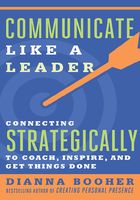
CHAPTER 10 Become a Coach, Not a Critic
Praise works with only three types of people: men, women, and children.
—UNKNOWN
You're not really going to eat a second serving, are you?" "Is that on your diet?" "You've sure put on a few pounds over the summer, haven't you?" Ask anyone who has ever tried to lose weight about their reaction to a spouse or parent who continually nags with comments like these.
Then ask that same person to compare results in losing weight while working with an encouraging coach (or even an online program with canned feedback): "Good work!" "Impressive!" "You've gained two pounds. But don't give up. Just get back on your personal eating plan. You can do this!"
I repeat: Ask any dieter which approach works best, coaching or critiquing, and I guarantee they'll select the coach every time. Ditto for the workplace.
Life coaches and personal trainers seem to be the new status symbols. From corporate CEOs to the seventeen-year-old language student, everyone's talking about their personal fitness trainer or their financial accountability coach. Like bosses, coaches expect you to show up, work hard, and do what you say you will. Accountability, encouragement, and support prove to be far greater motivators than judgment and criticism.
Here's how you as a team leader or manager can become a strategic coach rather than simply a critic.
Help your team members identify their strengths. As far as you have the power to do so, put people in positions and on projects that allow them to use those strengths to shine. Far too many people struggle, working in jobs (sometimes lifelong careers) that do not make use of their strengths. No matter how much training and mentoring they receive, at best, they'll improve those "weaknesses" until they become only "average" performers.
Ask any dieter which approach works best, coaching or critiquing, and I guarantee they'll select the coach every time.
Ditto for the workplace.
Communicate the goal, any specific expectations, and clear standards to measure success. Make sure team members know the desired outcome. Specify any processes they have to follow to achieve the goal (legal, organizational, industry-specific). How will they know they've been successful? What are the specific measurements? Due dates? Quality ratings? Complaints handled per hour? Widgets completed? Absence of mistakes? Money saved?
Provide resources. What's the budget? Overtime hours? Extra head count? Access to equipment, training, experts, or data?
Build confidence. Your belief in them inspires their own confidence. Their commitment to you—and possibly to other team members—in writing that they will accomplish X by Y date and having you believe in them starts the adrenaline pumping.
Warn of potential danger ahead. Coaches help develop safeguards so that weaknesses won't waylay a person's overall success. In other words, as a coach you'll help ward off problems before they develop. With projects or plans that may be in jeopardy, point out trouble spots and suggest check-back points for further direction before problems reach a crisis.
Give clear feedback. In the study conducted by the authors of The 2020 Workplace and discussed in their book by the same title, Jeanne Meister and Karie Willyerd point out that the ability employees most want in their leaders ("straight feedback") is what's most lacking. As judged by HR professionals, leaders lack both the will and the skill to provide helpful feedback to their team members.
To address the "will" part of the equation, understand that your team wants and needs to hear from you about their performance—even if your feedback is less than glowing. When you first begin to work together, let them know that feedback is "what we do in this department" and that they'll be receiving feedback and coaching often as "an investment in their career growth." Mention that philosophy as your modus operandi for accomplishing great things.
To address the "skill" part of any reluctance to give candid feedback, start with questions. Ask how the people involved think the X or Y project is going. Listen and evaluate their perspective. State your own observations, describing rather than labeling. Here's an example: "During the three hours I was in the trade-show booth, I noticed that we had heavy traffic. But at least fifty percent of the traffic was not our ideal customer. The pre-show marketing piece missed the target. It drew the mid-manager rather than the executive buyer."
Clear feedback can be the difference between success and failure, between attracting great talent and mediocre players, between retaining the best and watching them leave to learn elsewhere.
Offer encouragement. Be liberal with supportive comments when you see staff or colleagues doing well, even after small steps along the way. If you're a runner—particularly, a marathoner—you know that supporters along the route cheering you on make a big difference. If you've ever tried to lose weight, hearing "you're looking good" every five pounds or so certainly reinforces your commitment to healthy eating.
Provide stretch assignments to help others gain experience and deepen expertise. For example, is there a feasibility study that might gain traction with the executive team and also provide opportunity for them to interview key executives about their three-year goals for the organization? Could you suggest that they participate on a company-wide project team that will stretch their thinking?
Celebrate wins. A coach's slap on the back and "Great game" after a win feels much better than his or her walking away with a muttered "Done" or, worse, with head down and mumbling, "You've got work to do for the next game."
Whether you communicate as a coach or critic always comes down to a strategic decision—one that affects productivity, morale, absenteeism, and turnover—and ultimately shapes your culture for years. To sum up: Lead the ride from the side. Critique food, wine, and movies; coach people.